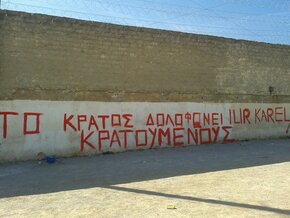Home > Other langages / Otros idiomas / Altri idiomi / Andere Sprachen... > In English > Greek prisons are boiling

Greek prisons are boiling
Friday 5 April 2013
All the versions of this article: [English] [français] [italiano]
On March 24th, 2014, prisoners across Greece announced mobilizations to protest ever-stricter detention conditions, demanding that the government’s draft law for maximum security prisons be withdrawn. According to this new bill, “dangerous†inmates sent to the type C units will not be granted prison furloughs and will have substantially restricted visitation rights.
On March 25th, amid rising tension in penitentiaries, Albania-born convict Ilia Kareli stabbed a prison guard to death with an improvised knife in Malandrino prison. Even though Kareli was imprisoned for a total of 16 years, he was recently denied furlough. The dead jailer, whom the mass media portrayed as almost a saint, was an infamous sadistic torturer who used to whip inmates with electric cables.
On March 27th, prisoner Ilia Kareli was transferred to solitary confinement in Nigrita prison (near the city of Serres, northern Greece), where he was later found dead due to multiple internal injuries and severe fractures caused by repeated beatings of killers in uniform. In other words, after taking the miserable life of a guard, he was tortured to death by the prison system.
In response to the murder of Ilia Kareli, as well as to this monstrous bill that Power is prepared to implement against prisoners in Greece, inmates in several prisons have held massive protests, in some cases with abstention from prison meals and/or refusal to be locked up in cells.
On Sunday afternoon, March 30th, a gathering was held outside the Nigrita prison, wherein Kareli was found dead. The action lasted more than an hour and was attended by 100 comrades from the cities of Thessaloniki, Serres and Kavala. The response of inmates was lively, as both sides exchanged shouts against the torturers-killers of the prison administration as well as slogans against cops, and in solidarity with the ongoing struggle of prisoners.
During the gathering, the administration tried everything in their power to hinder the communication between prisoners and people in solidarity. The institutional alarms were launched and announcements were continuously transmitted through loudspeakers so that the chants would not reach inside. However prisoners were not discouraged by the jailers’ effort; particularly in the C2 wing, surveillance cameras and glass windows, etc. were smashed by inmates.
Solidarity among people who revolt inside and outside the walls
 Non Fides - Base de données anarchistes
Non Fides - Base de données anarchistes